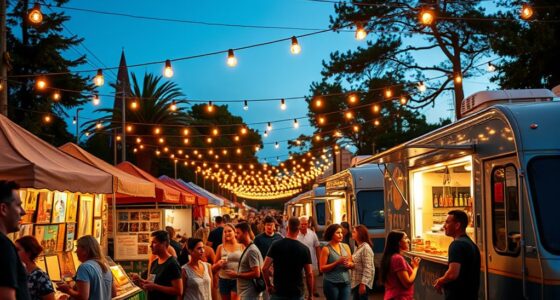To engage neighborhood councils for event approval, start by submitting a detailed proposal that covers your event’s purpose, location, attendance, and safety measures. Attend council meetings or schedule discussions to address concerns and demonstrate your commitment to community well-being. Build trust through transparency and compliance with local regulations, including obtaining necessary permits. Maintaining positive relationships and open communication increases your chances of approval, so continue exploring how to foster strong community support and navigate the process successfully.
Key Takeaways
- Submit detailed event proposals highlighting purpose, location, attendance, and safety measures to align with council expectations.
- Engage with neighborhood councils early through meetings or discussions to clarify requirements and foster collaboration.
- Ensure compliance with local permits and regulations for sound, food, and street closures to streamline approval.
- Build trust by maintaining transparency, respecting regulations, and demonstrating community-minded planning.
- Maintain open communication and positive relationships with council members and residents to support ongoing approvals.

Have you ever wondered who approves neighborhood events and how the process works? When planning a community gathering, festival, or block party, it’s crucial to understand that neighborhood councils often serve as the primary authority in granting approval. These councils play a significant role in promoting community engagement by ensuring that events align with local interests and values. They act as a bridge between residents, local authorities, and event organizers, fostering a sense of collective ownership and participation. But beyond community spirit, their responsibilities also include verifying that events meet regulatory compliance standards. This means confirming that safety measures, noise levels, permits, and other legal requirements are properly addressed before giving the green light.
Getting an event approved through a neighborhood council isn’t a passive process; it requires active engagement on your part. First, you’ll need to submit a detailed proposal outlining the event’s purpose, location, expected attendance, and duration. This proposal should also include measures to address community concerns, such as traffic control, waste management, and safety protocols. By proactively engaging with the council, you demonstrate your commitment to community well-being, making it easier for them to support your event. Attending council meetings or scheduling one-on-one discussions can help clarify expectations, answer questions, and foster a collaborative relationship. Remember, community engagement is a two-way street—listening to residents’ feedback and addressing potential issues early on can smooth the approval process. Additionally, understanding skincare patches can be an example of how targeted, well-timed interventions can effectively address specific issues, similar to how community engagement targets particular concerns during event planning.
Active engagement with the council and clear communication streamline event approval processes.
In addition to community engagement, regulatory compliance is a critical factor in obtaining approval. Different jurisdictions have specific rules governing public gatherings, which may include acquiring permits for amplified sound, food service, or street closures. Failing to adhere to these regulations can lead to delays or rejection, so it’s wise to research local ordinances beforehand. Working closely with the neighborhood council ensures you’re aware of all necessary permits and legal obligations. They often provide guidance or resources to help you meet these requirements efficiently. Also, some councils have established committees or designated staff members who review event plans and provide recommendations, streamlining the approval process. By demonstrating your understanding of regulatory standards and showing a willingness to comply, you increase your chances of gaining approval swiftly.
Ultimately, engaging neighborhood councils for event approvals involves building trust, maintaining open communication, and demonstrating your commitment to community safety and compliance. When you approach the process with transparency and respect for local regulations, you not only secure approval but also foster positive relationships within your community. This collaborative approach ensures that your event is successful, enjoyable, and beneficial for everyone involved.
Frequently Asked Questions
How Long Does the Approval Process Typically Take?
The approval process typically takes about 4 to 6 weeks, depending on your community engagement and permit procedures. You should submit your application early and follow up regularly to guarantee smooth communication. Neighborhood councils usually review event proposals promptly, but delays can happen if additional information or revisions are needed. Planning ahead and understanding the community engagement process helps you get approvals faster and avoid last-minute setbacks.
Are There Specific Guidelines for Different Types of Events?
Like a modern-day troubadour, you should know that event permit requirements vary depending on your event type. You’ll find specific guidelines tailored for community engagement activities, festivals, or private gatherings. Check with your neighborhood council to guarantee you meet all criteria, including safety measures and public access. This way, you streamline approval, avoid delays, and make your event a hit, all while respecting local regulations and community standards.
Can Neighborhood Councils Approve Events Outside Their Boundaries?
No, neighborhood councils generally can’t approve events outside their boundaries. They focus on local community engagement and guaranteeing events meet permit requirements within their area. If you’re planning an event beyond a council’s jurisdiction, you’ll need to seek approval from the relevant authorities or councils in that area. Always check specific guidelines to ensure compliance with permit requirements and community standards, avoiding potential conflicts or delays.
What Are Common Reasons for Event Approval Delays?
The approval process can feel like steering a labyrinth of delays. Common reasons include community engagement issues, where stakeholders raise concerns, and permit requirements that aren’t fully met. Sometimes, incomplete applications or missing documentation cause hold-ups. Additionally, if the event conflicts with neighborhood plans or policies, approval might be delayed. To speed things up, guarantee your application is thorough, addresses community interests, and complies with all permit requirements from the start.
Is There a Fee for Submitting an Event for Approval?
You typically won’t face an approval fee for submitting your event, but some neighborhoods might have event submission fees. These fees vary based on approval fee structures established by local councils. It’s best to check with your specific neighborhood council to understand any potential costs involved. Being aware of these fees upfront helps you plan your event budget accordingly and guarantees a smoother approval process.
Conclusion
Engaging neighborhood councils streamlines event approvals and fosters community trust. For instance, imagine planning a local street fair; collaborating early with the council guarantees smooth permits and strong support. By building relationships and keeping communication open, you not only gain approval faster but also create events that truly reflect your community’s needs. Embrace this approach, and you’ll turn your ideas into successful, well-loved gatherings that bring everyone together.









